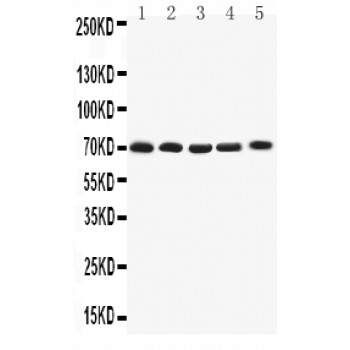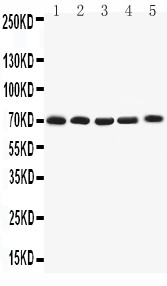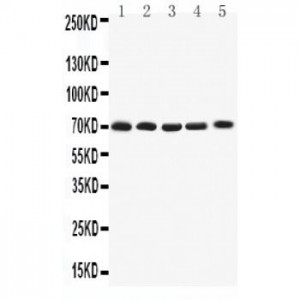More info
Overview
Long Name | Antibody Type | Antibody Isotype | Host | Species Reactivity | Validated Applications | Purification |
| potassium voltage-gated channel, shaker-related subfamily, member 4 | Polyclonal | IgG | Rabbit | Human, Mouse, Rat | WB | Immunogen affinity purified. |
Immunogen | ||||||
| A synthetic peptide corresponding to a sequence in the middle region of human Kv1.4(329-344aa LPEFRDDRDLVMALSA), different from the related mouse and rat sequences by one amino acid. | ||||||
Properties
Form | Lyophilized |
Size | 100 µg/vial |
Contents | Antibody is lyophilized with 5 mg BSA, 0.9 mg NaCl, 0.2 mg Na2HPO4, 0.05 mg Thimerosal and 0.05 mg NaN3. *carrier free antibody available upon request. |
Concentration | Reconstitute with 0.2 mL sterile dH2O (500 µg/ml final concentration). |
Storage | At -20 °C for 12 months, as supplied. Store reconstituted antibody at 2-8 °C for one month. For long-term storage, aliquot and store at -20 °C. Avoid repeated freezing and thawing. |
Additional Information Regarding the Antigen
Gene | KCNA4 |
Protein | Potassium voltage-gated channel subfamily A member 4 |
Uniprot ID | P22459 |
Function | Voltage-gated potassium channel that mediates transmembrane potassium transport in excitable membranes. Forms tetrameric potassium-selective channels through which potassium ions pass in accordance with their electrochemical gradient. The channel alternates between opened and closed conformations in response to the voltage difference across the membrane (PubMed:19912772, PubMed:8495559). Can form functional homotetrameric channels and heterotetrameric channels that contain variable proportions of KCNA1, KCNA2, KCNA4, KCNA5, and possibly other family members as well; channel properties depend on the type of alpha subunits that are part of the channel (PubMed:8495559). Channel properties are modulated by cytoplasmic beta subunits that regulate the subcellular location of the alpha subunits and promote rapid inactivation. In vivo, membranes probably contain a mixture of heteromeric potassium channel complexes, making it difficult to assign currents observed in intact tissues to any particular potassium channel family member. Homotetrameric KCNA4 forms a potassium channel that opens in response to membrane depolarization, followed by rapid spontaneous channel closure (PubMed:19912772, PubMed:8495559). Likewise, a heterotetrameric channel formed by KCNA1 and KCNA4 shows rapid inactivation (PubMed:17156368). |
Tissue Specificity | Detected in heart ventricle. |
Sub-cellular localization | Cell membrane. |
Sequence Similarities | |
Aliases | Voltage gated K+ channel HuKII antibody|cardiac potassium channel antibody|fetal skeletal muscle potassium channel antibody|HBK 4 antibody|HBK4 antibody|HK 1 antibody|HK1 antibody|HPCN 2 antibody|HPCN2 antibody|HUK II antibody|HUKII antibody|KCNA 4 antibody|KCNA 8 antibody|KCNA4 antibody|KCNA4_HUMAN antibody|KCNA4L antibody|KCNA8 antibody|kv1.4 antibody|PCN 2 antibody|PCN2 antibody|potassium channel 2 antibody|potassium channel KCNA4 antibody|potassium channel protein antibody|Potassium voltage gated channel shaker related subfamily member 4 antibody|Potassium voltage gated channel subfamily A member 4 antibody|potassium voltage-gated channel shaker-related subfamily member 4-like antibody|Potassium voltage-gated channel subfamily A member 4 antibody|rapidly inactivating potassium channel antibody|Shaker related potassium channel Kv1.4 antibody|shaker-related potassium channel Kv1.4 antibody|type A potassium channel antibody|Voltage gated potassium channel HBK4 antibody|Voltage gated potassium channel HK1 antibody|Voltage gated potassium channel subunit Kv1.4 antibody|Voltage-gated K(+) channel HuKII antibody|voltage-gated potassium channel antibody|Voltage-gated potassium channel HBK4 antibody|Voltage-gated potassium channel HK1 antibody|voltage-gated potassium channel protein Kv1.4 antibody|Voltage-gated potassium channel subunit Kv1.4 antibody |
Application Details
| Application | Concentration* | Species | Validated Using** |
| Western blot | 0.1-0.5μg/ml | Human, Rat Mouse | AssaySolutio's ECL kit |
AssaySolution recommends Rabbit Chemiluminescent WB Detection Kit (AKIT001B) for Western blot. *Blocking peptide can be purchased at $65. Contact us for more information

Anti-Kv1.4 antibody, ASA-B1141, All Western blotting
All lanes: Anti-KCNA4(ASA-B1141) at 0.5ug/ml
Lane 1: Rat Brain Tissue Lysate at 40ug
Lane 2: HY1080Whole Cell Lysate at 40ug
Lane 3: PANC Whole Cell Lysate at 40ug
Lane 4: U87 Whole Cell Lysate at 40ug
Lane 5: SHG Whole Cell Lysate at 40ug
Predicted bind size: 70KD
Observed bind size: 70KD
All lanes: Anti-KCNA4(ASA-B1141) at 0.5ug/ml
Lane 1: Rat Brain Tissue Lysate at 40ug
Lane 2: HY1080Whole Cell Lysate at 40ug
Lane 3: PANC Whole Cell Lysate at 40ug
Lane 4: U87 Whole Cell Lysate at 40ug
Lane 5: SHG Whole Cell Lysate at 40ug
Predicted bind size: 70KD
Observed bind size: 70KD



